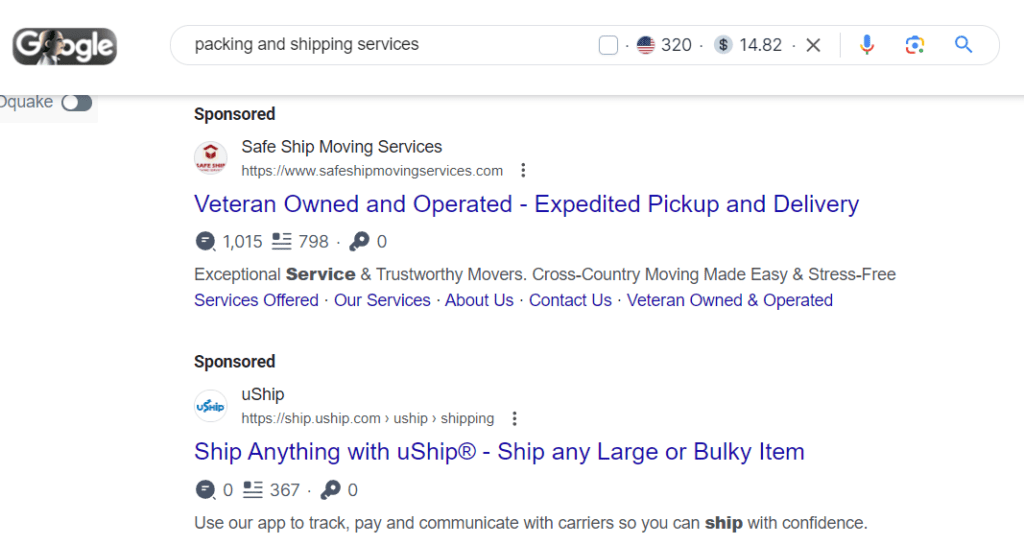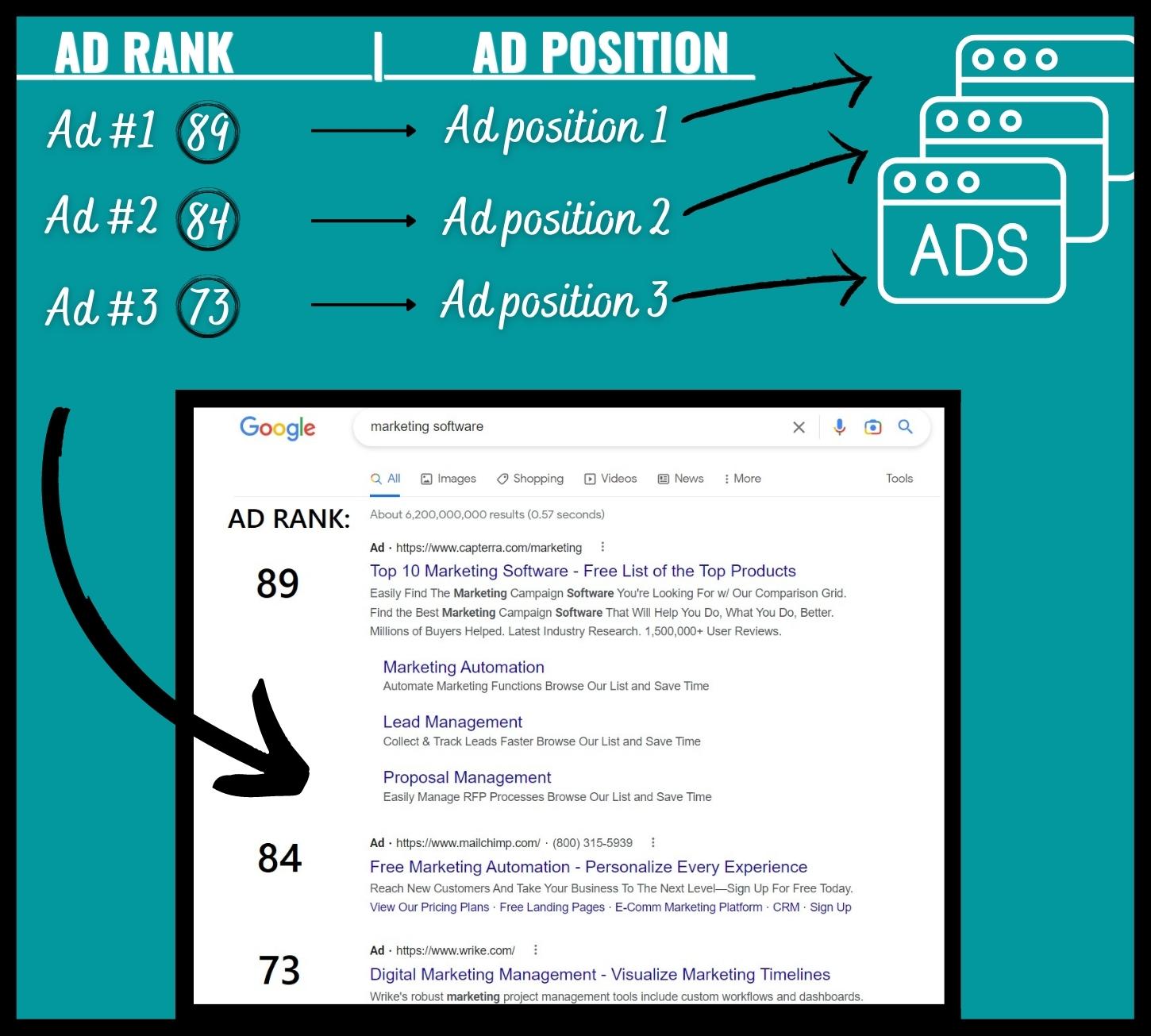Every time you search on Google and ads are eligible to appear, an auction takes place behind the scenes. I wrote this article to explain how it works and how you can improve your ad campaigns.
What is the Google Ads Auction?
The Google Ads auction determines which ads appear on a search results page, their order, and whether any ads appear. To understand how the Google Ads auction works, it’s essential to know that it occurs every time someone searches for a keyword. The process involves evaluating various factors such as bids, ad quality, and relevance to decide which ads are eligible for display and which positions. Advertisers can influence their ad visibility by optimizing these factors and creating successful Google Ads campaigns.
The Google Ads Auction Process Explained
Step 1: Identifying Eligible Ads
At the start of each auction, Google Ads identifies all eligible ads meeting the targeting criteria based on the searched keywords. Only ads meeting the minimum Ad Rank threshold are considered. Achieving the highest ad rank is crucial for better ad positions.

Step 2: Assigning Ad Rank
Google Ads assigns a grade called Ad Rank to each eligible advertisement. This crucial metric determines which ads appear first and their order on the page. Quality Score, which includes factors like click-through rate (CTR), ad relevance, and the quality of landing pages, significantly influences Ad Rank.

Step 3: Ranking the Ads
After the auction, ads are ranked according to their Ad Rank scores.
Example of Ad Rank in the Google Ads Auction
Let’s consider a search for “Marketing Software”. If the Ad Rank scoring scale was 0-100, the auction might look like this:

What Determines Ad Rank in the Google Ads Auction?
Ad Rank is a value assigned to each ad entering an auction. It considers various factors to grade each advertisement, which Google then uses to rank. Ad extensions can enhance an ad’s relevance and improve its Quality Score, affecting Ad Rank. Your ads receive a new grade for every relevant keyword search.
Key Factors Influencing Ad Rank and Ad Relevance in the Auction
- Your Bid: This is the maximum amount you’ll pay for a click. Smart Bidding optimizes this for each auction.
- Ad Quality at Auction: Google evaluates the relevance and usefulness of your ads and landing pages to users. This includes expected clickthrough rate, landing page experience, and ad relevance to the keyword.
- Expected Impact of Ads and Assets: Relevant keyword targeting and use of assets (like images, sitelinks, callouts) can help you win auctions even without the highest bid.
- Ad Context: Google considers the searcher’s location, device, time of day, and other attributes to determine ad relevance.
Understanding Ad Position
Ad position refers to the location of an ad on a search engine results page (SERP). This position is crucial as it determines the ad’s visibility and potential click-through rate (CTR). The ad auction process considers factors such as ad relevance, quality, and bid amount, and determines the ad position. Ads that secure top positions on the SERP generally enjoy higher visibility and receive more clicks than those placed lower on the page. Therefore, achieving a higher ad position can significantly enhance the effectiveness of your advertising campaign, driving more traffic and potential conversions.
Alternative Bidding Methods
Google Ads offers several alternative bidding methods beyond the traditional cost-per-click (CPC) model, allowing businesses to tailor their payment strategies to their specific goals. These methods include:
- Cost-per-thousand impressions (CPM) bidding: This approach charges businesses for every 1,000 times their ad is displayed, regardless of whether it is clicked. CPM bidding is ideal for campaigns focused on brand awareness and visibility.
- Cost-per-acquisition (CPA) bidding: With CPA bidding, businesses pay for each conversion or action generated from their ad, such as a sale or lead. This method is beneficial for campaigns that drive specific actions and maximize return on investment.
- Cost-per-view (CPV) bidding: This model charges businesses for each view of their video ad, regardless of whether it is clicked. CPV bidding is particularly useful for video campaigns to increase engagement and reach.
By choosing the appropriate bidding method, businesses can optimize their ad spend and more effectively achieve their advertising objectives.
Auction Insights and Competitor Analysis
Auction Insights is a valuable report within Google Ads that provides detailed data on how your ads perform compared to your competitors in the same ad auctions. This report includes key metrics such as impression share, overlap rate, position above rate, and outranking share. By analyzing these metrics, businesses can comprehensively understand their competitive landscape and identify areas for improvement.
For instance, if a competitor consistently outranks you for a particular keyword, you might consider adjusting your bid or refining your ad copy to enhance your ad’s performance. Additionally, Auction Insights can reveal new opportunities to target your ads more effectively. By identifying gaps in your competitors’ strategies, you can develop targeted ad campaigns to capture those opportunities and improve your overall ad performance.
Overall, leveraging Auction Insights allows businesses to gain a competitive edge in the Google Ads auction, optimize their ad strategies, and achieve better results in their advertising campaigns.
Optimizing Your Strategy for the Google Ads Auction
To improve your performance in the Google Ads auction:
- Create organized, relevant campaigns for your target keywords
- Ensure your ads are closely targeted to searched keywords
- Develop relevant, high-quality landing pages
- Utilize a variety of ad assets to enhance ad quality
Conclusion
Understanding the nuances of the Google Ads auction allows advertisers to plan strategically for higher ad rankings. The key to success lies in creating relevant, well-organized campaigns that align with your target keywords, paired with high-quality ads and landing pages.
Focusing on these elements can improve your Ad Rank and achieve better results in the Google Ads auction, ultimately driving more effective advertising campaigns.



